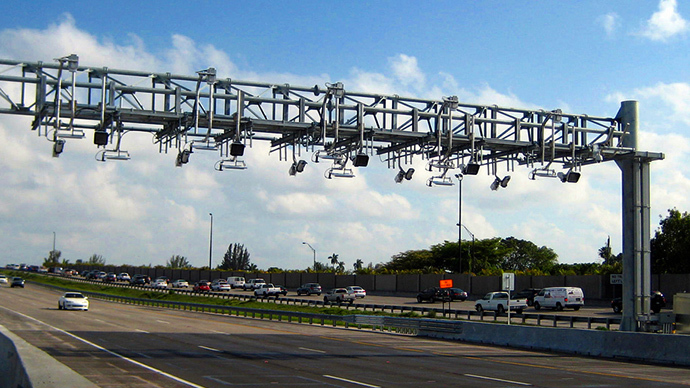Homeland Security cancels national license plate tracking plan

Only days after the US Department of Homeland Security began seeking a company to help it track license plates nationwide, the agency has reportedly canceled the initiative over civil liberties concerns.
According to the Washington Post, Homeland Security Secretary Jeh Johnson canceled the plan on Wednesday, after media outlets noticed a proposal by the Immigration and Customs Enforcement agency looking for partners to help develop the tracking system.
As RT reported this week, the plan would allow DHS and other law enforcement officials to sift through a nationwide database of license plates once they are photographed, collected, and stored on a system owned by a private company. Government officials stated the database would be used to help locate illegal immigrants who are on the run from authorities, but civil liberties advocates became worried about the possibility that it would also be used to track the movement of American citizens.
ICE spokeswoman Gillian Christensen tried to downplay these concerns, saying the database “could only be accessed in conjunction with ongoing criminal investigations or to locate wanted individuals.”
These words didn’t do much to calm groups concerned with potential abuse, especially in light of ongoing leaks regarding the National Security Agency’s wide-ranging surveillance program.
“Ultimately, you’re creating a national database of location information,” Jennifer Lynch, a staff attorney with the Electronic Frontier Foundation said on Tuesday. “When all that data is compiled and aggregated you can track somebody as they go through their life.”
On Thursday, Christensen confirmed that DHS and ICE have nixed the project.
“The solicitation, which was posted without the awareness of ICE leadership, has been cancelled,” she said in a statement. “While we continue to support a range of technologies to help meet our law enforcement mission, this solicitation will be reviewed to ensure the path forward appropriately meets our operational needs.”
The decision was greeted with open arms by opponents, some of which found cause for concern even in Christensen’s statement. Speaking with the Post, Rep. Bennie Thompson (D-Miss.) – the ranking Democrat on the House Homeland Security Committee – said the idea ICE leadership was unaware of the proposal “highlights a serious management problem within this DHS component that currently does not have a director nominated by the president.”
Others, meanwhile, were relieved to see the listing taken down, especially since the ICE’s promise to comply with the Privacy Act of 1974 did not necessarily mean the system wouldn’t be abused.
“The Privacy Act protections are quite weak, especially because they have loads of exemptions for law enforcement,” said Harley Geiger of the nonprofit Center for Democracy & Technology.
The cancellation of this nationwide initiative doesn’t mean that local law enforcement agencies don’t currently use similar methods. Private companies have already set up smaller license plate databases with local agencies in order to track traffic violations as well as suspected criminal meetings.














